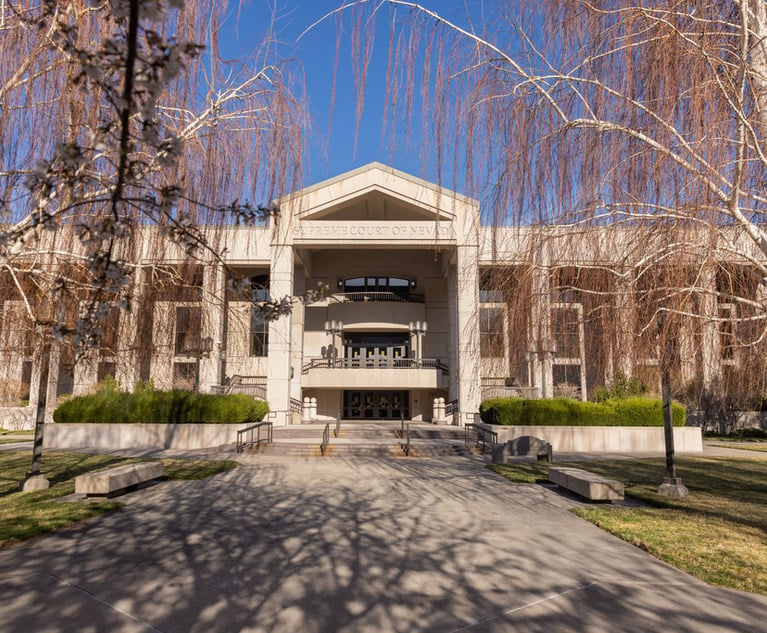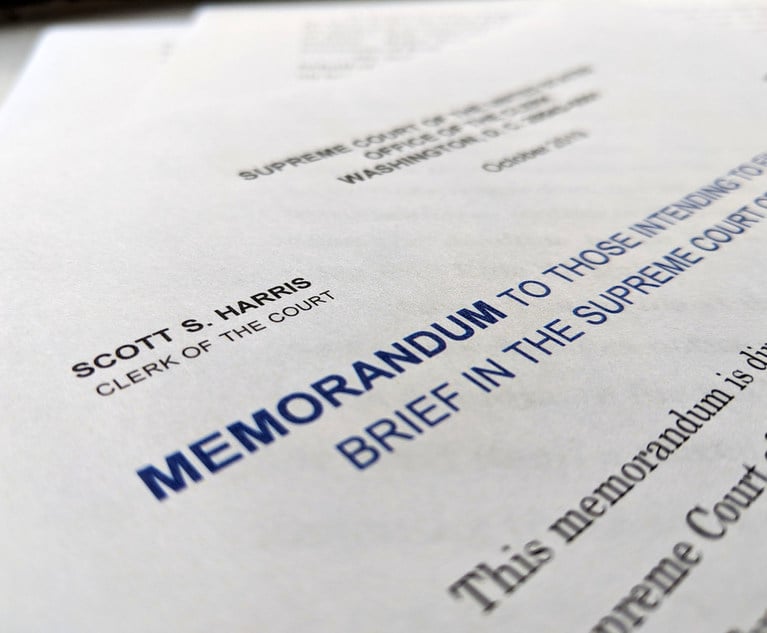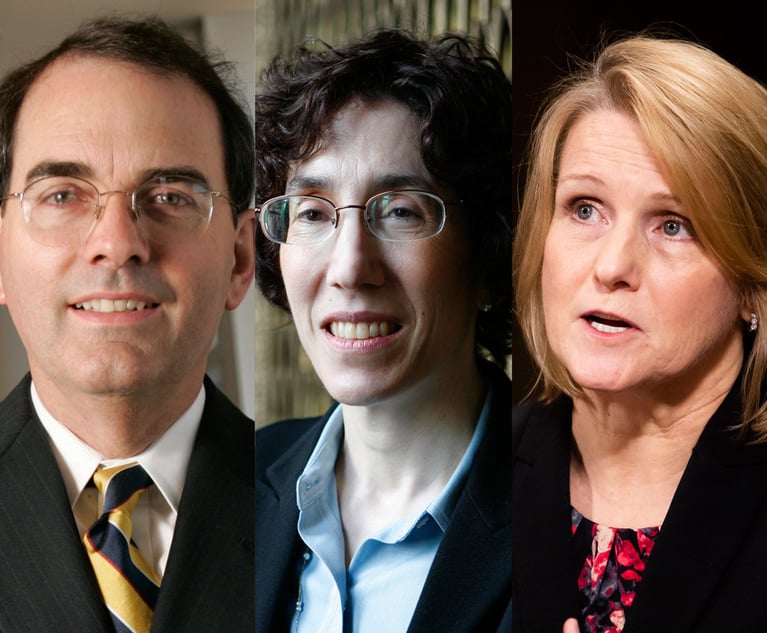Inside the Supreme Court, There Was Kennedy and Everyone Else
The final day of the U.S. Supreme Court term almost always brings some drama with it—a rumored or surprise retirement, a landmark decision. The focus on this Monday was on Justice Anthony Kennedy and whether the court would say something about President Donald Trump's travel ban.
June 26, 2017 at 02:32 PM
8 minute read
The rumor mill went into overdrive over the weekend and into Monday morning: Justice Anthony Kennedy would retire. Justice Anthony Kennedy would not retire.
Kennedy, hosting a reunion for his clerks on June 24, addressed the speculation: “There has been a lot of speculation about … a certain announcement from me tonight,” he said, according to the blog Above the Law. “And that announcement is: the bar will remain open after the end of the formal program!”
On Monday morning, with paper in hand, the justice emerged from the red velvet curtain behind the high court bench along with his colleagues. Ten o'clock sharp, as always. Today was the final decision day of the term. Now what was on that paper?
The final day of the Supreme Court term almost always brings some drama with it—a rumored or surprise retirement, a landmark decision. The focus on this Monday was on Kennedy and whether the court would say something about President Donald Trump's travel ban. (It did.)
And sometimes on that final day, the justices' faces telegraph how the last few weeks went behind the scenes. Who can forget Justice Stephen Breyer's look of outrage as he read his dissent in the 2007 school desegregation decision or Chief Justice John Roberts Jr.'s clenched jaw as he, the majority author, listened? Or the sheer fatigue on many of their faces when the court announced the outcome of the first challenge to the Affordable Care Act?
On Monday, tourists filled most of the public seats behind the rail that separates them from seating for members of the Supreme Court bar. The visitors and their buses are all over Capitol Hill at this time of year. Only a smattering of lawyers showed up to take the bar seats, including end-of-term regular Arthur Spitzer, legal director of D.C.'s American Civil Liberties Union. Jordan Lorence of Alliance Defending Freedom sat there with colleagues awaiting the big church-state decision in Trinity Lutheran Church v. Comer.
Noel Francisco, still awaiting a U.S. Senate vote on his nomination as U.S. solicitor general, was in the bar audience. The acting solicitor general, Jeffrey Wall, took his traditional seat with members of his office at the lawyers' table in front of the high court bench.
Some of the justices' spouses usually show up for the final day, and this Monday was no different. Sitting in the justices' guest seats to the right of the bench were Jane Roberts and the chief justice's children; Breyer's wife, Joanna; and Justice Clarence Thomas' wife, Virginia.
Still, all eyes were on Kennedy who wore his usual somewhat stern, poker face that morning.
Thomas read a summary of the first opinion: Davila v. Davis, in which a 5-4 majority held that ineffective assistance of post-conviction counsel does not excuse the procedural default of ineffective assistance of appellate counsel claims. Kennedy then read a summary of a securities decision involving California's largest public pension fund. Roberts read the majority opinion in Trinity while a relaxed Kennedy sipped from his mug and leaned back in his chair.
Because the justices read summaries of their opinions from junior to most senior justice (always the chief), it was evident with Roberts' reading of Trinity Lutheran that at least one of three remaining cases would be reargued. Roberts announced a per curiam opinion vacating and remanding Hernandez v. Mesa, the border-shooting case. The court ordered rearguments in two immigration cases, Jennings v. Rodriguez and Sessions v. Dimaya.
Before gaveling in a recess until the first Monday in October, Roberts acknowledged two court employees who had recently retired and a new retirement. Reporters poised their pens—could this be the Kennedy announcement?
In what may have been a first in recent history, Roberts acknowledged the retirement of newsman Lyle Denniston after 69 years in journalism. Denniston's career began at a small town newspaper in Nebraska. His 58 years covering the high court, Roberts noted, span many volumes of the U.S. Reports.
And then the justices were gone, until the first Monday in October.
Related Articles:
|- Justices, Shying From Second Amendment, Won't Touch California's Gun Restrictions
- SCOTUS Ends Term With Blow to Class Action Plaintiffs
- Corporate Whistleblowers Catch the Supreme Court's Attention
- Justices Revive Suit Against US Agent Who Fatally Shot Mexican Teenager
- SCOTUS Will Review Gay Wedding Cake Case From Colorado
The rumor mill went into overdrive over the weekend and into Monday morning: Justice Anthony Kennedy would retire. Justice Anthony Kennedy would not retire.
Kennedy, hosting a reunion for his clerks on June 24, addressed the speculation: “There has been a lot of speculation about … a certain announcement from me tonight,” he said, according to the blog Above the Law. “And that announcement is: the bar will remain open after the end of the formal program!”
On Monday morning, with paper in hand, the justice emerged from the red velvet curtain behind the high court bench along with his colleagues. Ten o'clock sharp, as always. Today was the final decision day of the term. Now what was on that paper?
The final day of the Supreme Court term almost always brings some drama with it—a rumored or surprise retirement, a landmark decision. The focus on this Monday was on Kennedy and whether the court would say something about President Donald Trump's travel ban. (It did.)
And sometimes on that final day, the justices' faces telegraph how the last few weeks went behind the scenes. Who can forget Justice Stephen Breyer's look of outrage as he read his dissent in the 2007 school desegregation decision or Chief Justice John Roberts Jr.'s clenched jaw as he, the majority author, listened? Or the sheer fatigue on many of their faces when the court announced the outcome of the first challenge to the Affordable Care Act?
On Monday, tourists filled most of the public seats behind the rail that separates them from seating for members of the Supreme Court bar. The visitors and their buses are all over Capitol Hill at this time of year. Only a smattering of lawyers showed up to take the bar seats, including end-of-term regular Arthur Spitzer, legal director of D.C.'s American Civil Liberties Union. Jordan Lorence of Alliance Defending Freedom sat there with colleagues awaiting the big church-state decision in Trinity Lutheran Church v. Comer.
Noel Francisco, still awaiting a U.S. Senate vote on his nomination as U.S. solicitor general, was in the bar audience. The acting solicitor general, Jeffrey Wall, took his traditional seat with members of his office at the lawyers' table in front of the high court bench.
Some of the justices' spouses usually show up for the final day, and this Monday was no different. Sitting in the justices' guest seats to the right of the bench were Jane Roberts and the chief justice's children; Breyer's wife, Joanna; and Justice
Still, all eyes were on Kennedy who wore his usual somewhat stern, poker face that morning.
Thomas read a summary of the first opinion: Davila v. Davis, in which a 5-4 majority held that ineffective assistance of post-conviction counsel does not excuse the procedural default of ineffective assistance of appellate counsel claims. Kennedy then read a summary of a securities decision involving California's largest public pension fund. Roberts read the majority opinion in Trinity while a relaxed Kennedy sipped from his mug and leaned back in his chair.
Because the justices read summaries of their opinions from junior to most senior justice (always the chief), it was evident with Roberts' reading of Trinity Lutheran that at least one of three remaining cases would be reargued. Roberts announced a per curiam opinion vacating and remanding Hernandez v. Mesa, the border-shooting case. The court ordered rearguments in two immigration cases, Jennings v. Rodriguez and Sessions v. Dimaya.
Before gaveling in a recess until the first Monday in October, Roberts acknowledged two court employees who had recently retired and a new retirement. Reporters poised their pens—could this be the Kennedy announcement?
In what may have been a first in recent history, Roberts acknowledged the retirement of newsman Lyle Denniston after 69 years in journalism. Denniston's career began at a small town newspaper in Nebraska. His 58 years covering the high court, Roberts noted, span many volumes of the U.S. Reports.
And then the justices were gone, until the first Monday in October.
Related Articles:
|- Justices, Shying From Second Amendment, Won't Touch California's Gun Restrictions
- SCOTUS Ends Term With Blow to Class Action Plaintiffs
- Corporate Whistleblowers Catch the Supreme Court's Attention
- Justices Revive Suit Against US Agent Who Fatally Shot Mexican Teenager
- SCOTUS Will Review Gay Wedding Cake Case From Colorado
This content has been archived. It is available through our partners, LexisNexis® and Bloomberg Law.
To view this content, please continue to their sites.
Not a Lexis Subscriber?
Subscribe Now
Not a Bloomberg Law Subscriber?
Subscribe Now
NOT FOR REPRINT
© 2024 ALM Global, LLC, All Rights Reserved. Request academic re-use from www.copyright.com. All other uses, submit a request to [email protected]. For more information visit Asset & Logo Licensing.
You Might Like
View All
Divided 5th Circuit Shoots Down Nasdaq Diversity Rules

Nevada Supreme Court to Decide Fate of Groundbreaking Contingency Cap Ballot Measure
5 minute read
Lawyers, Law Groups Oppose Proposal to Require Court Approval for Amicus Briefs

9th Circuit Judges Weigh if Section 230 Shields Grindr From Defective Design Claims
Trending Stories
- 1Call for Nominations: Elite Trial Lawyers 2025
- 2Senate Judiciary Dems Release Report on Supreme Court Ethics
- 3Senate Confirms Last 2 of Biden's California Judicial Nominees
- 4Morrison & Foerster Doles Out Year-End and Special Bonuses, Raises Base Compensation for Associates
- 5Tom Girardi to Surrender to Federal Authorities on Jan. 7
Who Got The Work
Michael G. Bongiorno, Andrew Scott Dulberg and Elizabeth E. Driscoll from Wilmer Cutler Pickering Hale and Dorr have stepped in to represent Symbotic Inc., an A.I.-enabled technology platform that focuses on increasing supply chain efficiency, and other defendants in a pending shareholder derivative lawsuit. The case, filed Oct. 2 in Massachusetts District Court by the Brown Law Firm on behalf of Stephen Austen, accuses certain officers and directors of misleading investors in regard to Symbotic's potential for margin growth by failing to disclose that the company was not equipped to timely deploy its systems or manage expenses through project delays. The case, assigned to U.S. District Judge Nathaniel M. Gorton, is 1:24-cv-12522, Austen v. Cohen et al.
Who Got The Work
Edmund Polubinski and Marie Killmond of Davis Polk & Wardwell have entered appearances for data platform software development company MongoDB and other defendants in a pending shareholder derivative lawsuit. The action, filed Oct. 7 in New York Southern District Court by the Brown Law Firm, accuses the company's directors and/or officers of falsely expressing confidence in the company’s restructuring of its sales incentive plan and downplaying the severity of decreases in its upfront commitments. The case is 1:24-cv-07594, Roy v. Ittycheria et al.
Who Got The Work
Amy O. Bruchs and Kurt F. Ellison of Michael Best & Friedrich have entered appearances for Epic Systems Corp. in a pending employment discrimination lawsuit. The suit was filed Sept. 7 in Wisconsin Western District Court by Levine Eisberner LLC and Siri & Glimstad on behalf of a project manager who claims that he was wrongfully terminated after applying for a religious exemption to the defendant's COVID-19 vaccine mandate. The case, assigned to U.S. Magistrate Judge Anita Marie Boor, is 3:24-cv-00630, Secker, Nathan v. Epic Systems Corporation.
Who Got The Work
David X. Sullivan, Thomas J. Finn and Gregory A. Hall from McCarter & English have entered appearances for Sunrun Installation Services in a pending civil rights lawsuit. The complaint was filed Sept. 4 in Connecticut District Court by attorney Robert M. Berke on behalf of former employee George Edward Steins, who was arrested and charged with employing an unregistered home improvement salesperson. The complaint alleges that had Sunrun informed the Connecticut Department of Consumer Protection that the plaintiff's employment had ended in 2017 and that he no longer held Sunrun's home improvement contractor license, he would not have been hit with charges, which were dismissed in May 2024. The case, assigned to U.S. District Judge Jeffrey A. Meyer, is 3:24-cv-01423, Steins v. Sunrun, Inc. et al.
Who Got The Work
Greenberg Traurig shareholder Joshua L. Raskin has entered an appearance for boohoo.com UK Ltd. in a pending patent infringement lawsuit. The suit, filed Sept. 3 in Texas Eastern District Court by Rozier Hardt McDonough on behalf of Alto Dynamics, asserts five patents related to an online shopping platform. The case, assigned to U.S. District Judge Rodney Gilstrap, is 2:24-cv-00719, Alto Dynamics, LLC v. boohoo.com UK Limited.
Featured Firms
Law Offices of Gary Martin Hays & Associates, P.C.
(470) 294-1674
Law Offices of Mark E. Salomone
(857) 444-6468
Smith & Hassler
(713) 739-1250










